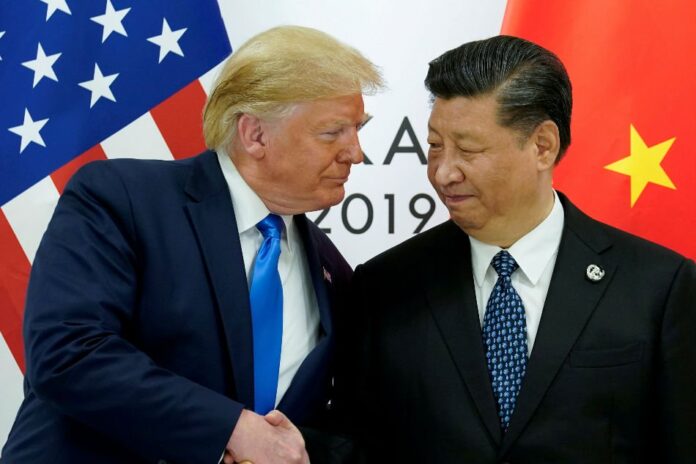BEIJING: US retailers and global financial markets got an early Christmas present Tuesday as President Donald Trump’s administration announced it is delaying tariffs on key consumer electronic goods imported from China.
And news that top US and Chinese trade officials spoke by telephone early Tuesday offered further signs of a possible letup in the trade war that had been escalating in recent weeks.
Trump said that conversation was “very productive,” and said he agreed to delay imposing tariffs on some goods to protect consumers going into the holiday shopping season — even while continuing to insist that Americans are not paying for the tariffs.
After two days of declines, global stock markets surged higher, especially electronics manufacturers like Apple, amid relief over the view there might be an agreement that would forestall the feared hit to a world economy already showing signs of strain.
The latest round of tariffs on $300 billion in Chinese goods, due to take effect on September 1, meant all Chinese imports into the United States would be subject to additional duties.
Trump’s August 1 tariff announcement prompted immediate outcry from retailers as they prepare for the holiday shopping season.
But the office of the US Trade Representative (USTR) said Tuesday it is delaying until December 15 imposition of new 10pc tariffs on Chinese-made cell phones, laptops, computer monitors, video game consoles and some toys, footwear and clothing.
“We’re doing this for Christmas season just in case some of the tariffs would have an impact on US customers but so far they have had really none,” Trump told reporters Tuesday in New Jersey.
An odd assortment of goods will benefit from the reprieve, including baby furniture, diapers and men’s suits, as well as frozen fish, cigar holders, sugar beets, pesticides, bedding and school supplies.
In addition, USTR said, “certain products are being removed from the tariff list based on health, safety, national security and other factors and will not face additional tariffs of 10pc.”
About 25 product lines that will be exempted from any new tariffs include car seats, shipping containers and cranes for ports. Also Bibles and other religious literature.
“We are certainly relieved that a lot of the items won’t see an impact for this holiday season,” said Rebecca Mond of The Toy Association.
But “We would like to see the threat of tariffs completely removed,” she told AFP.
The National Retail Federation also cheered the decision, but warned that uncertainty continues, and tariffs “will result in higher costs for American families and slow the US economy.”
The business group urged Trump to join forces with allies to deal with China’s “unfair trade practices.”
But Trump has repeatedly said he prefers unilateral action, and again Tuesday threatened to withdraw from the World Trade Organization.
“We know that they have been screwing us for years and it’s not going to happen again,” he said.
TALKS BY PHONE
US Trade Representative Robert Lighthizer spoke with Chinese Vice Premier Liu He early Tuesday and has another call planned in two weeks, a USTR official told AFP. Treasury Secretary Steven Mnuchin also participated in the call, officials said.
US and Chinese negotiators met in Shanghai in late July for the first time since talks collapsed in May, and the sides were due to hold another round of meetings in Washington in September.
However, relations soured further in the past two weeks and Trump on Friday indicated that the next round of talks might not happen, saying Washington was “not ready to make a deal.”
Trump accused Beijing of continuing to renege on its commitment to buy US agricultural goods.
“They said they are going to buy farm products. So far they have disappointed me,” Trump said. “They haven’t been truthful or let’s say they certainly delayed the decision.”
Trump has continued to publicly pursue hardline tactics against China, repeatedly excoriating Beijing for backing out of conditions he says were agreed, and manipulating its currency to gain a trade advantage over American firms.
The United States is demanding that China make changes to reduce the US trade deficit. It wants Beijing to open China’s economy to more foreign products and foreign companies, reduce subsidies and stop the theft of American technology.



































